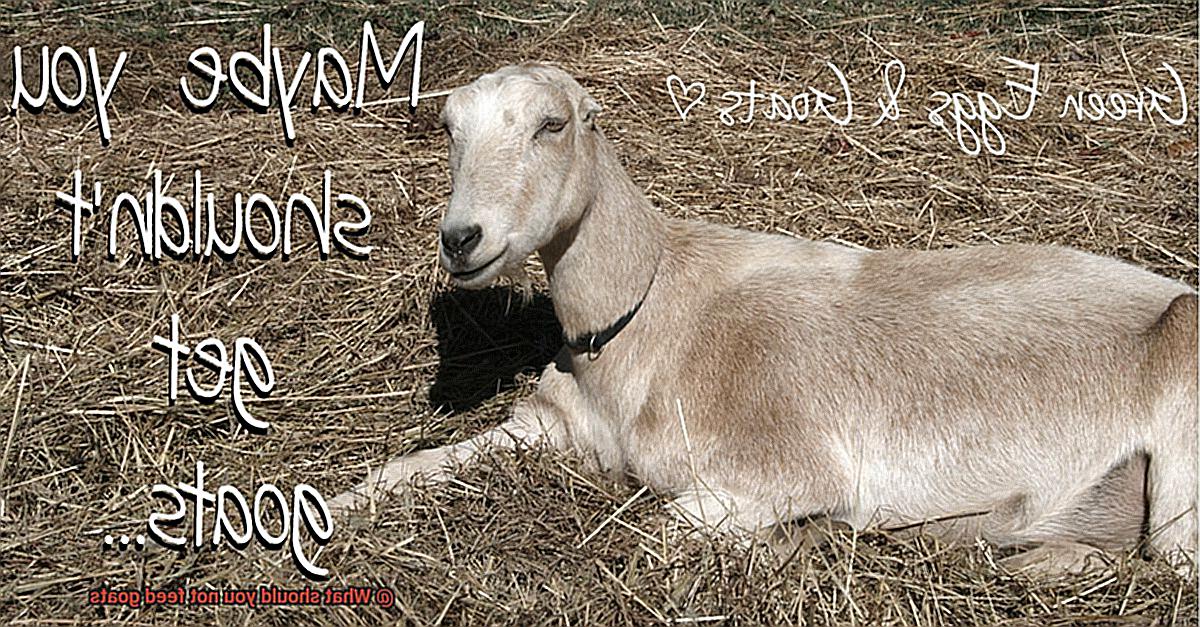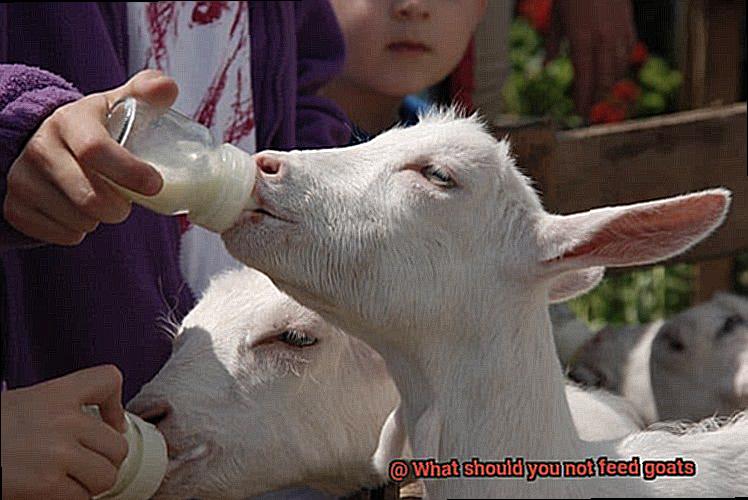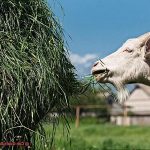Are you considering adding a goat to your family or farm? Goats are known for their voracious appetites and ability to eat almost anything, but that doesn’t mean they should. In fact, feeding goats the wrong foods can lead to serious health issues, malnourishment, and even death. So, what should you not feed goats? The answer is not as straightforward as it may seem.
Whether you’re a seasoned farmer or a new pet owner, it’s crucial to understand the dos and don’ts of goat feeding. In this article, we’ll explore the foods that can cause digestive problems, toxicity, or nutrient imbalances in goats. Did you know that while some fruits and vegetables are healthy for humans, they can be harmful to goats? We’ll also delve into some common poisonous plants that grow around homes and pastures that could pose a significant threat to goats.
So if you want to keep your goats healthy and happy, join us as we navigate the world of goat feeding. From toxic weeds to nutrient imbalances, we’ll help you steer clear of the foods your furry friends should avoid at all costs.
What is Avocado and Why Should it be Avoided?
Contents
One food that should never be given to goats is avocado. While it is a highly nutritious fruit for humans, it can be deadly for our four-legged friends.

The culprit is a toxic substance called persin, which is present in all parts of the avocado tree – leaves, bark, fruit, and seeds. Even small amounts of persin can damage goats’ vital organs and lead to respiratory distress or even heart failure. Ingesting avocado can also cause digestive issues like diarrhea, vomiting, and bloating in goats, leading to rapid weight loss.
So, why take any chances? Make sure your goats don’t have access to any avocado trees or fruits. If you suspect that they’ve accidentally ingested some avocado, contact your veterinarian immediately for proper treatment.
What is Chocolate and Why Should it be Avoided?
However, it’s important to be aware of certain foods that can be harmful to them. One such food is chocolate – a popular treat among humans but potentially deadly for goats.
Chocolate contains a toxic compound called theobromine, which can cause a range of health issues in goats. This stimulant affects the central nervous system and cardiac muscle, leading to increased heart rate, muscle tremors, seizures, and even death in severe cases. Therefore, it is crucial to avoid giving your goats any type of chocolate, no matter how tempting it may be.
It’s worth noting that the toxicity of theobromine varies depending on the type of chocolate and the size of the goat. For example, dark chocolate contains higher levels of theobromine than milk chocolate, making it even more dangerous for goats. So, even a small amount of chocolate can be harmful to your furry friends.
In addition to theobromine, chocolate also contains caffeine, which can have similar effects on goats as it does on humans. Caffeine can cause restlessness, muscle twitching, and heart palpitations in goats – all leading to potential health problems that should be avoided at all costs.
So what treats can you give your goats instead? Fruits and vegetables are always a great option. Not only are they nutritious and healthy, but they’re also safe for goats to consume. Alternatively, you can find specific goat treats that are designed for their dietary needs. By being mindful of what you feed your goats and avoiding harmful foods like chocolate or caffeine products, you can help ensure their health and well-being for years to come.
What are Molds and Why Should they be Avoided?
While goats are known to be able to eat almost anything, not all foods are safe for them. Molds are one such danger that can cause potential harm to your furry friends.
Molds are a type of fungus that can grow on organic materials, including hay and grains. These pesky fungi produce spores that, if inhaled, can cause respiratory problems in goats. In addition, moldy feed can contain mycotoxins which are toxic substances produced by some molds. These mycotoxins can wreak havoc on your goats’ health by causing liver damage, digestive problems, and immune system suppression.
To avoid these health issues, it’s crucial always to check hay and feed for signs of mold before feeding your goats. Make sure to look out for discolored or slimy hay with a musty smell or grains with an odd odor. If you suspect that your hay or feed has mold, it’s best to dispose of it immediately.
Storing hay and feed properly is also essential in preventing the growth of mold. Ensure that hay is stored in a dry, well-ventilated area away from moisture and humidity. Likewise, feed should be stored in a cool, dry place and checked regularly for signs of mold.
What are Pesticides and Herbicides and Why Should they be Avoided?
One significant threat to your goats’ health is the use of pesticides and herbicides. These chemicals are commonly used in agriculture to kill pests and weeds and increase crop yields. Still, they can also pose a severe risk to your goats if ingested.
Goats are curious creatures that love to explore their surroundings and try new things, including nibbling on plants that have been treated with pesticides or herbicides. Unfortunately, this can lead to serious health issues such as cancer, reproductive problems, and birth defects.
Moreover, these harmful chemicals can contaminate the soil and water, which can then be ingested by your goats while grazing. This can cause long-term health problems for your furry friends.
To keep your goats safe and healthy, it’s crucial to avoid feeding them any plants that have been treated with pesticides or herbicides. Always read labels carefully before using any chemicals on your property and try to find natural alternatives whenever possible. Your goats will thank you for taking this extra step.
Suppose you suspect that your goat has consumed a plant that has been treated with these dangerous chemicals. In that case, it’s essential to contact your veterinarian immediately. Quick action can make all the difference in preventing serious health issues or even saving your goat’s life.
What are Rhubarb Leaves and Why Should they be Avoided?
If so, it’s important to be aware of the potential dangers that exist in your goats’ grazing area, particularly when it comes to toxic plants. One such plant that you should avoid at all costs are rhubarb leaves.
Rhubarb leaves may seem harmless with their large, green appearance, but they contain high levels of oxalic acid, which can cause kidney failure and even death in goats if ingested in large quantities. Symptoms of oxalic acid poisoning in goats include depression, lethargy, difficulty breathing, and even seizures. Therefore, it’s critical to keep rhubarb leaves away from your goats to ensure their safety.
It’s worth noting that rhubarb leaves aren’t the only toxic plants that goat owners need to be aware of. Other common plants such as azaleas, oleander, and yew have also been known to cause harm to goats. Even seemingly harmless plants like tomato or potato leaves can be toxic if ingested in large quantities. Therefore, it’s essential to research any new plants before feeding them to your goats.
To keep your goats safe from toxic plants, it’s best to stick to a diet of hay, grass, and commercial goat feed. This will ensure that they receive all the nutrients they need without putting them at risk for potentially deadly poisoning. As a goat owner, your top priority is to ensure the health and happiness of your animals, and avoiding toxic plants is one way to do just that.
What are Potato Peels and Green Potatoes and Why Should They Be Avoided?
However, feeding them scraps from your kitchen without knowing what foods can be harmful to goats can be risky. One food to avoid is potato peels, which contain solanine, a toxic substance that can lead to severe health issues for goats. Ingesting solanine can cause digestive upset, diarrhea, and even death in goats. Therefore, it’s crucial to steer clear of feeding potato peels to your goats.
Another food that should be avoided is green potatoes. These spuds also contain solanine, which is produced when potatoes are exposed to light. While this natural defense mechanism of the potato plant helps deter pests and predators, it can have harmful effects on goats if ingested. Discard any potatoes that have started to turn green or show signs of spoilage or rot as they can contain harmful bacteria that can make your goats sick.
It is important to note that while potatoes themselves are not toxic to goats, it’s best to feed them in moderation and only as an occasional treat. A balanced diet consisting of hay, grass, and other forages should make up the bulk of your goat’s diet with grains and supplements added as needed. Feeding too many treats like potatoes can result in nutritional imbalances and health issues down the line.
ajCMKyLEV5w” >
Conclusion
In conclusion, feeding goats the wrong foods can have devastating consequences. It’s crucial to understand what not to feed them, whether you’re a seasoned farmer or a new pet owner. Goats may be known for their insatiable appetites and ability to eat almost anything, but not all foods are safe for them. Some fruits and vegetables that are healthy for humans can be harmful to goats. Furthermore, common poisonous plants that grow around homes and pastures could pose a significant threat to goats.
To keep your goats healthy and happy, it’s essential to avoid giving them avocado, chocolate, potato peels, green potatoes, and rhubarb leaves as they contain toxic substances that can cause respiratory distress or even heart failure in goats. Additionally, molds on hay and feed can produce spores that can cause respiratory problems in goats while mycotoxins can damage their liver and immune system. Pesticides and herbicides used in agriculture can also pose a severe risk if ingested by your goats.
To ensure your goats stay healthy, stick to a diet of hay, grass, commercial goat feed supplemented with occasional treats like fruits and vegetables designed for their dietary needs. By being mindful of what you feed your goats and avoiding harmful foods like chocolate or caffeine products, you’ll help ensure their health and well-being for years to come.






